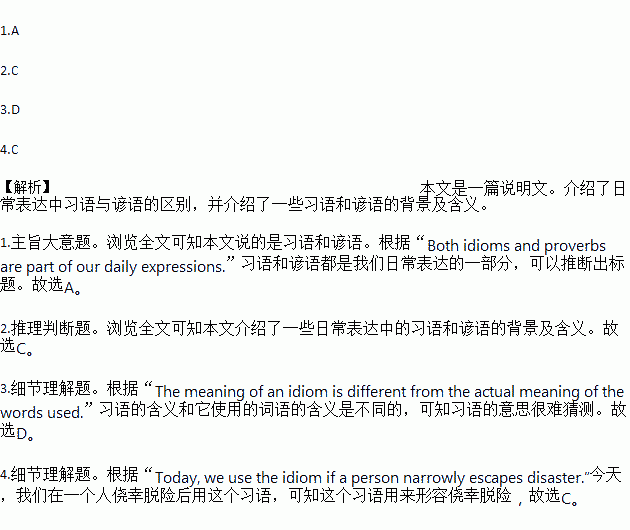题目内容
If you say, “The cat’s out of the bag” instead of “The secret is given away,” you’re using an idiom. The meaning of an idiom is different from the actual meaning of the words used. “An apple a day keeps the doctor away” is a proverb. Proverbs are old but familiar sayings that usually give advice. Both idioms and proverbs are part of our daily expressions. Many are very old and have interesting histories. See how many of these expressions you know.
“Bury the hatchet.”
Native Americans used to bury weapons to show that fighting had ended and enemies were now at peace. Today, the idiom means to make up with a friend after an argument of fight.
“A close shave.”
In the past, student barbers learned to shave on customers. If they shaved too close, their customers might be cut or even hardly escape serious injury. Today, we use the idiom if a person narrowly escapes disaster.
“Raining cats and dogs.”
In Norse mythology the dog is associated with wind and the cat with storms. This expression means it’s raining very heavily.
To “shed crocodile tears.”
Crocodiles have a reflex that causes their eyes to tear when they open their mouths. That makes it look as though they are crying while swallowing their food. In fact, neither crocodiles nor people who shed “crocodile” tears feel sorry for their actions.
“Saved by the bell.”
In 17th-century England, a guard at Windsor Castle was accused of falling asleep at his post. He claimed he was wrongly accused and could prove it; he had heard the church bell chime (鸣响) thirteen times at midnight. Townspeople supported his claim and he was saved. Today we think of the bell that ends a round in boxing, often saving the boxer from injury, or the bell at the end of a class period, saving you from more work. Now this idiom means rescue from a situation at the last possible moment.
1.The best title of this passage will probably be ___________.
A. Everyday Expressions B. Not Idioms But Proverbs
C. Idioms and proverbs are old D. Idioms or proverbs
2.The purpose of this article is to ________.
A. compare some useful and interesting idioms and proverbs
B. tell us some idioms and proverbs which can be used today
C. explain the meaning of some interesting everyday expressions
D. show the importance of using proverbs and idioms in your writing
3.It can be inferred from the article that _________.
A. idioms and proverbs are a must in our life
B. proverbs are more common than idioms
C. idioms are more interesting than proverbs
D. it is difficult to guess the meaning of idioms
4.Which of these statements is an example of “a close shave”?
A. My brother bought a new computer yesterday.
B. My friend will come to my city to see me.
C. A car nearly hit me on my way to school.
D. No one in my school has ever been to Canada.


 destroy all those things. Will we use our words to hurt or to heal? The choice is ours.
destroy all those things. Will we use our words to hurt or to heal? The choice is ours.